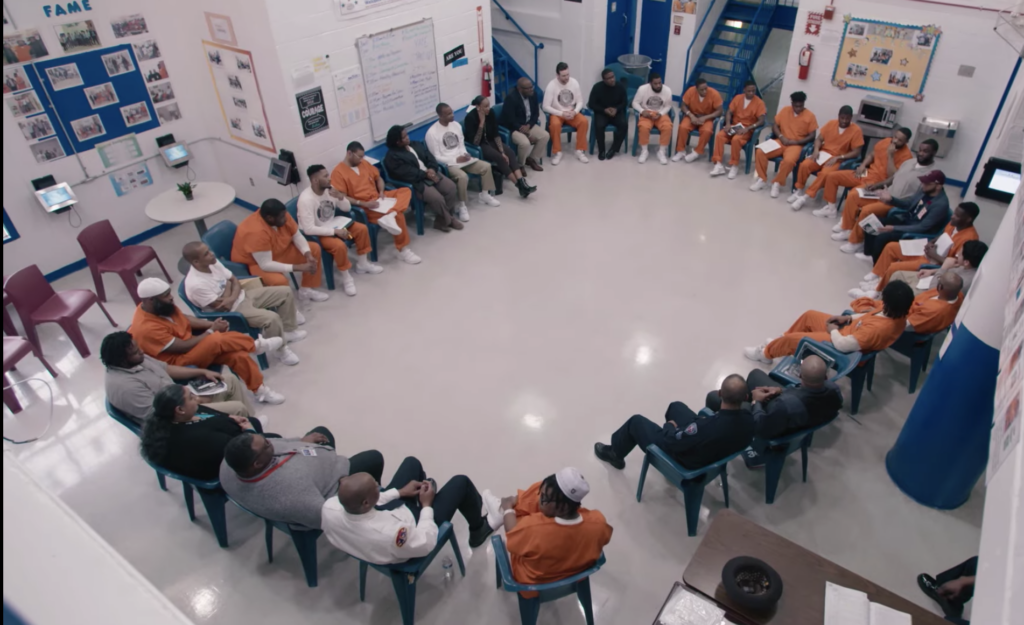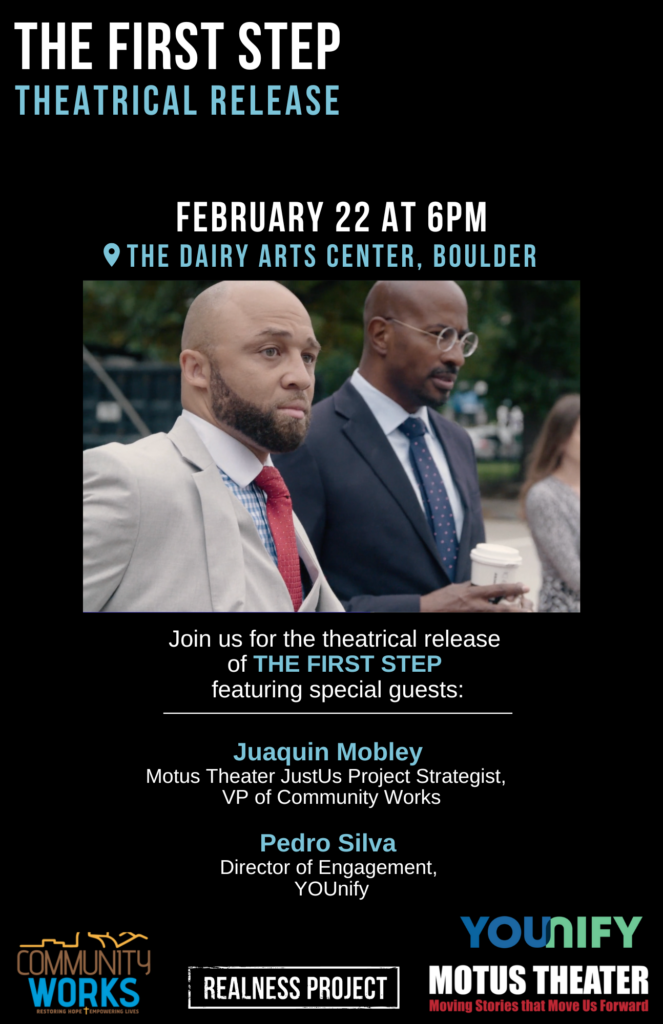Boulder’s Realness Project creates safety in — and out — of prison
 Friday, Feb. 3, 2023
Friday, Feb. 3, 2023
On Wednesday, February 22, the Dairy Arts Center in Boulder (2590 Walnut) will screen “The First Step,” a documentary chronicling CNN host Van Jones’ efforts to get a criminal justice reform bill through Congress with bipartisan support.
Learn more and watch a trailer: firststepfilm.com/
Boulder-based nonprofit Realness Project is sponsoring the event. We chatted with Realness Project’s executive director, Laurie Lazar, to learn more about her work, the film and the need for criminal justice reform.
What is the Realness Project?
Realness Project, we’re a nonprofit based in Boulder. We go into prisons and run programs in prisons. What we’re committed to is transforming the experience of incarceration through the power of human connection. It’s all about creating better humans rather than better criminals.
Our taxpayer money is going to pay for people in prison. Why not have it pay for people who are going to come out and infuse our society with really positive relational skills?
How did you get connected with the filmmakers, and why did you want to sponsor the screening?
This film that is coming out, they’re doing this premiere of it across the country. The filmmakers reached out and said, ‘Let’s talk. We’re planning on coming to the Dairy in Boulder.’ That was my neighborhood. I watched the film, and I’m just a huge fan of Van Jones and what he does and what he stands for.
He seems to be a real champion for the dignity of all human beings, no matter who they are. That’s a stand we take. They also are really committed to overcoming obstacles in the field of polarization. That’s what we do as well.
There’s a lot of polarization in prison, with races and gangs. We help people see beyond that and bring down the walls and create something new. Van Jones did that with The First Step Act.
(Editor’s note: The First Step Act, passed in 2018, was the first criminal justice reform bill passed in more than a decade. It shortened sentences for some and enabled others to leave prison earlier through compassionate release or participation in rehabilitation and recidivism-reducing programs. Learn more.)

Why is Realness Project in Boulder when there aren’t any prisons here?
We did start off at the Boulder County Jail. We brought this two-day program, which is called The Art of Being Human, in 2018. I worked with a colleague of mine, who had started an organization bringing this two-day program all over the world to the public. He and I partnered to bring it into the Boulder County Jail, where I was doing work with victim impact.
We brought it in, really not knowing if it was going to be well received. There was a guy there that said, ‘This is the first time I’ve taken my mask off in front of another human being.’ They said to us, ‘This is what we need; there’s nothing like this in the system, please take this everywhere.’
I decided to start this nonprofit. We brought it into a few prisons in Colorado. We’ve delivered this work to over 600 inmates in the Colorado Department of Corrections. Our recidivism rate is less than 5% of the people who have gone through our program. (Editor’s note: Colorado’s recidivism rate is 50%, one of the worst in the nation.)
What we do is a combination of communication skills and mental health modalities. Our programming really focuses on generating human dignity and balancing it out with true humility. Our program also focuses on creating community and connection, so it’s very experiential. It’s not top-down, student-teacher: The people in the workshop are mostly interacting with each other and learning new skills for listening and reflecting and responding to threats and conflict. And through the process, the sort of natural generation of empathy and compassion and kind of self-confidence and care … I want to say love, self love, is really what gets generated in the room.
We have almost 20,000 people living behind bars in Colorado right now. 98-99% of people serving time will be getting out, and they can actually be leaders, they can actually be influencers. Almost all the men have kids, multiple kids, and they have absolute impact on those children. How they relate to them right now is going to determine how safe our streets are tomorrow.
People want help. The question is, are we going to provide it or not?
It’s interesting that there are multiple nonprofits based in Boulder County working with the incarcerated population, and at the same time we’ve seen a lot of movement in the other direction, with residents advocating for harsher penalties and more prison time. Boulder played a big part in killing Colorado’s cash bail reform bill.
People are concerned about homelessness and crime, and the steps we are taking are creating more crime. Punishment is all well and good, but they will be getting out and being part of our society. Punishment is putting them into these metal cages … what we do with them when they’re there, the joke is on us if we don’t create better humans when they’re in there.
Most people don’t like the violence of more crime, more addiction. The antidote to addiction is not abstinence, it’s connection. That’s what we’re generating: connection.
We have waitlists in all the prisons we’re working in. We are also working in community, with Second Chance Center in Aurora. The reality is when people get out of prison, they’re working two jobs, they don’t have time to learn communication and relationship skills. The day someone enters prison, that’s the day their pre-release should start. When they find out they’re walking out that door, they’re so worried about where they’re going to land and live. We need to be doing this from Day 1.
I don’t want everyone to be locked up so they have to do this, but we have this opportunity while people are in our custody. Not everybody is going to want it. There’s a lot of people who still want to play the games of gangs and stuff, but there are a lot of people who don’t. We are working with lifers, and they are eating this stuff up. They are transforming their culture of incarceration themselves. They are role models.
I had someone in our course say, ‘We can redefine what it means to be cool in prison. If I knew how good it feels to be vulnerable, I would have done it a long time ago.’ Another guy said, ‘It’s the first two days I’ve felt like a human being since I’ve been in there.’
There’s massive mental health challenges in the prison system, and there’s very little support. You kind of have to be suicidal to get a therapist assigned to you. People want help: that’s what people need to realize. The question is, are we going to provide it or not?
Let’s get back to the film for a second. What about it or from it really stuck with you?
What really stuck with me was what can happen when people take a stand for something, they invite people into that, and then they keep marching down the road regardless of whatever obstacles are in the way, together. This is all about us joining together to re-humanize one another to find solutions together, even if we have different opinions or ideas about how problems started.
Van Jones is really criticized by both sides — by the left for having anything to do with the Trump administration, then the Republicans that looked at Van Jones like, ‘Who are you and what are you doing here?’ He would kind of welcome all that stuff and say, ‘Yes, and … let’s keep going.’ He refused to dehumanize anyone, even if he had very different opinions from them.
What we’re up to is creating safer environments in prison and out of prison. It’s all connected.
How is that relevant to us, here and now, in Boulder? What’s your pitch for folks to go see this film?
Are you concerned about the polarization in our community, in our nation and our world? It’s the modeling of how we work with people that we think don’t see the world in the right way, that they don’t get it. It gives us a lot of ideas about how to create a better world together.
We’re always going to be living with people who see the world differently than we do. The mud-slinging is just not going to get us very far. I think that’s why this film is important.
At the same time, I want to acknowledge the real trauma that can come from working with folks who are actively trying to take away your rights, or supporting people and policies that do. Does the message of this film go beyond the pat and trite calls for unity and collegiality? Does it have space for what it feels like to be working with people who might actively be oppressing you, or trying to oppress you?
I think so, yes. (Van Jones) went to a community with some people who voted for Trump, some who didn’t. He got them all together in a room and invited them to express their views of the world, their experiences of oppression. It shows why it was really important to get all those voices in the room together.
What else should I be asking that I’m not? What is critical to understanding your work or the film?
The film is really about addressing our social ills in a way we haven’t thought of before. People might not have thought about the direct link to the way people are living in prison and our growing problems on the outside, but when we have such mass incarceration, there is a direct link. And we have the power to make a difference in that.
What we’re up to is creating safer environments in prison and out of prison. It’s all connected.
How can Boulderites learn more about and support your work?
Go to realnessproject.org, there’s a tab called The Ripple. What we’re really up to is starting a movement of human connection, starting from the shadows of our community. Even $10/month can support a person living behind bars to go through this program.
Sign up for our newsletter so they know what is happening. If they want to get involved and go with us into prisons, they can.
— Shay Castle, @shayshinecastle or on Mastodon at toot.bldrweb.org/@shayshinecastle
Help make the Beat better. Was there a perspective we missed, or facts we didn’t consider? Email your thoughts to boulderbeatnews@gmail.com
Want more stories like this, delivered straight to your inbox?
Police addiction Boulder Boulder County Jail city of Boulder CNN Colorado Department of Corrections crime criminal justice reform incarceration mental health policing prison reform Realness Project recidivism The First Step Act Van Jones
Sign up for a weekly newsletter from Boulder Beat.
Police addiction Boulder Boulder County Jail city of Boulder CNN Colorado Department of Corrections crime criminal justice reform incarceration mental health policing prison reform Realness Project recidivism The First Step Act Van Jones

